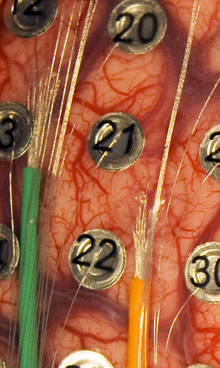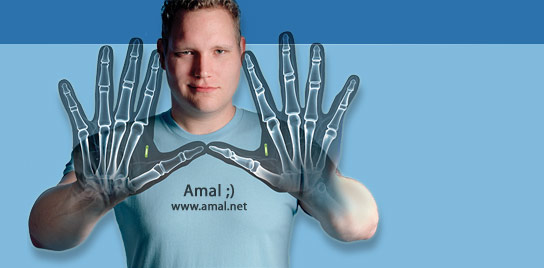 Researchers at Intel are confident we will be using brain implants to surf the web using only our thoughts.
Researchers at Intel are confident we will be using brain implants to surf the web using only our thoughts.
The first goal is to decode common human brain signals. Back in the 50s and 60s, both the US and the Russians were doing some pretty bizarre brain experiments… some of which were of the “open the skull and prod the gray wrinkly stuff with electrodes” variety. Other experiments noted that there were similarities in people’s brainwaves when specific stimuli were applied to the subject. For example, my brain produces hundreds of signals when I think of a banana or am shown a picture of a banana. When you think of a banana or are shown a picture of a banana, your brain produces a ton of signals as well, however a small number of signals are similar to mine… even if its a picture of a different banana. What this says is that our two different brains produce similar signals when identifying the same concept… the idea of a banana, and not necessarily the exact image or smell or taste of one, is what researchers at Intel are trying to hone in on. The brainwave vocabulary of the mind is slowly being revealed.
 What I’m really waiting for though is an output interface. Being able to just wonder if I got any new emails and having my mobile phone bring it up for me would be great, but what I’m really waiting for is not having to take my phone out at all. You might think I want to be able to see the screen through some kind of Matrix style floating virtual screen in front of me, and that would be cool… but what I’d really like is something a little more subtle. If I get to wondering if I have any new emails, or specifically “if there’s anything new from Dan today”, a much more useful way to receive an answer from the system would simply be a sense of “knowing” that there was “nothing new today”. Of course, if there were something new, a sense of “better take a look” would pop into my brain and I would get the phone out, or invoke the virtual screen.
What I’m really waiting for though is an output interface. Being able to just wonder if I got any new emails and having my mobile phone bring it up for me would be great, but what I’m really waiting for is not having to take my phone out at all. You might think I want to be able to see the screen through some kind of Matrix style floating virtual screen in front of me, and that would be cool… but what I’d really like is something a little more subtle. If I get to wondering if I have any new emails, or specifically “if there’s anything new from Dan today”, a much more useful way to receive an answer from the system would simply be a sense of “knowing” that there was “nothing new today”. Of course, if there were something new, a sense of “better take a look” would pop into my brain and I would get the phone out, or invoke the virtual screen.
If every brain really does have a similar pattern for every single concept humanly imaginable, then the possibilities are endless. The power behind this is that the brain is doing the heavy lifting by communicating in concepts and not hard words/facts.
Of course, that raises some pretty scary possibilities, especially if hackers or viruses got ahold of the interface. If universal concepts are the language of the brain when it comes to communicating and acting on ideas, then a properly timed concept like “jump” might just get someone to go for a flying leap out a window. What about inducing the idea of “give up” to push someone contemplating suicide over the edge, or maybe slipping the concept of satisfaction and confidence to a voter when they look at a certain name on a ballot. A computer virus with the right access to just such a brain interface could easily monitor incoming signals for “trigger thoughts”, then easily output a carefully chosen concept.
What if “thought police” became a reality quicker than you could have ever imagined? What if it could be automated? An inmate simply thinks of the concept of “escape”… not even as far as planning, just thinking of breaking out and they get flagged for “close supervision”, if you know what I mean. It wouldn’t matter if the inmate thought “escape” or “break out” or “run for it” or “on the lamb” or even just “sneaking out with the laundry truck”, the concept is the same; “illegally sneaking/getting out of prison”. That concept is different from the concept of getting out of prison when your time is up, or even the concept of freedom or being free from prison.
That age old debate has probably never been more poignant – Is technology good or evil, or is that determined simply by how its used? Probably no other technology, not even nuclear technology, is in such an acute position as this is. One thing’s for sure, the next 15-20 years are going to be an interesting ride!













Tying in closely with the concepts and issues you mentioned in this post is a book called “Feed”, by M.T. Anderson. From Amazon’s description of the book:
“(M.T. Anderson).. has created a not-to-distant future world where everything is accessed via a “feed” that is implanted directly into the brain. An internalized internet, the feed even allows for “chatting” so there is little need to speak if one chooses not to and true reading is nearly obsolete.”
It’s an incredible read. Anyone who enjoyed reading (or writing, hint hint) this post would probably enjoy this book. I’ve loaned my copy out to quite a few people, and haven’t heard a negative review yet. It’s mind boggling.
Thanks for the post! I’m ordering a copy right now: http://rcm.amazon.com/e/cm?lt1=_blank&bc1=000000&IS2=1&bg1=FFFFFF&fc1=000000&lc1=0000FF&t=rt09-20&o=1&p=8&l=as1&m=amazon&f=ifr&md=10FE9736YVPPT7A0FBG2&asins=0763622591